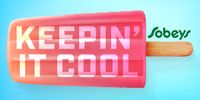Driving in the winter isn't something we can avoid but there are things we can do to ensure we are safe and prepared for the worst.
The Humboldt and District Fire and Rescue had some tips for people who might end up stuck on the side of the road.
- Try to stay calm and don't go out in the cold.
- Stay in your car: you will avoid getting lost and your car is a safe shelter.
- Don't tire yourself out. Shoveling in the intense cold can be deadly.
- Let in fresh air by opening a window on the side sheltered from the wind.
- Keep the engine off as much as possible.
- Be aware of carbon monoxide poisoning and make sure the exhaust pipe is not obstructed by snow.
- If possible, use a candle placed inside a deep can instead of the car heater to warm up.
- Turn on warning lights or set up road flares to make your car visible.
- Turn on the ceiling light; leaving your headlights or hazard lights on for too long will drain the battery.
- Move your hands, feet, and arms to maintain circulation.
- Stay awake.
- Keep an eye out for other cars and emergency responders.
- Try to keep clothing dry since wet clothing can lead to a dangerous loss of body heat.
- Always have winter safety and emergency equipment in your car.
The HDF recommends having a basic car emergency kit. The kit should have these items:
- Food that won't spoil, such as energy bars
- Water—plastic bottles that won't break if the water freezes (replace them every six months)
- Blanket
- Extra clothing and shoes or boots
- First aid kit with seatbelt cutter
- Small shovel, scraper, and snowbrush
- Candle in a deep can and matches
- Wind‑up flashlight
- Whistle—in case you need to attract attention
- Roadmaps
- Copy of your emergency plan
- Sand, salt or cat litter (non-clumping)
- Antifreeze and windshield washer fluid
- Tow rope
- Jumper cables
- Fire extinguisher
- Warning light or road flares
You may never need to use the items but it is important to have them should a situation arise when you do need them.
Also with the cold weather plugging in your vehicle is important. The Humboldt Fire and Rescue had some safety tips about block heaters.
"Block heaters are generally very safe, however, any fault in the electrical cord is a potential source of ignition. Owners should watch out for frayed or cracked cords as these can expose electrical wiring and cause a short circuit or a build-up of heat where the wires are compromised. Any extension cords for block heaters should be of either medium or heavy-gauge wire and have a three-prong plug that includes a ground wire. We also recommend a ground fault receptacle be used at the power source and if possible park a safe distance away from your home so that if a fire does occur it can not spread to your home. Don't drive over your extension cord. This can cause cracking/breaking during bitterly cold weather. Cover your block heater plug-in with its protective cover. This will help prevent corrosion. Unplug your block heater by using the hard, rubber end. Pulling on the electrical cord can cause breakage and potential electrical issues. Have your block heater cord inspected each fall by a qualified mechanic."
If you are traveling you should always check the highway hotline to ensure conditions are safe for travel.














